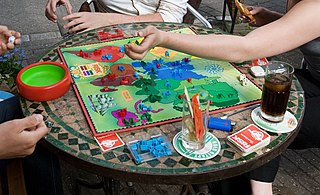
Risk is a strategy board game of diplomacy, conflict and conquest for two to six players. The standard version is played on a board depicting a political map of the world, divided into forty-two territories, which are grouped into six continents. Turns rotate among players who control armies of playing pieces with which they attempt to capture territories from other players, with results determined by dice rolls. Players may form and dissolve alliances during the course of the game. The goal of the game is to occupy every territory on the board and, in doing so, eliminate the other players. The game can be lengthy, requiring several hours to multiple days to finish. European versions are structured so that each player has a limited "secret mission" objective that shortens the game.

Admiral is one of the highest ranks in some navies. In the Commonwealth nations and the United States, a "full" admiral is equivalent to a "full" general in the army, and is above vice admiral and below admiral of the fleet, or fleet admiral. In NATO, admirals have a rank code of OF-9 as a four-star rank.
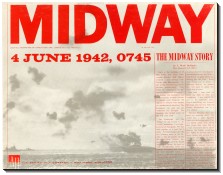
Midway is a wargame by Avalon Hill which simulates the Battle of Midway, during World War II. The game is designed for 2 or more players and simulates the battle at the individual ship and squadron level.
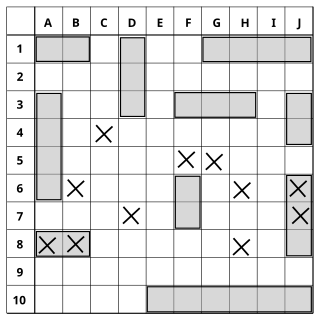
Battleship is a strategy type guessing game for two players. It is played on ruled grids on which each player's fleet of ships are marked. The locations of the fleets are concealed from the other player. Players alternate turns calling "shots" at the other player's ships, and the objective of the game is to destroy the opposing player's fleet.
Cosmic Coasters is a board game designed by Andrew Looney and published by Looney Labs. In 2002, Cosmic Coasters won the Origins Award for Best Abstract Board Game of 2001.
History of the World is a board game designed by Ragnar Brothers and originally published in 1991. It is played by up to six players in seven epochs, each player playing a different empire in each epoch.
War at Sea is a strategic board wargame depicting the naval war in the Atlantic during World War II, published by Jedko Games in 1975, and subsequently republished by Avalon Hill in 1976 and more recently by L2 Design Group in 2007.

Kingmaker is a board game created by Andrew McNeil. It was first produced in the UK by PhilMar Ltd. in 1974. The second edition was produced by Avalon Hill in the United States in 1975. This version was somewhat different from the original, as it refined the rules and required less knowledge about England to play. TM Games also released an edition in 1983 that was essentially a re-issue of the Avalon Hill version, as did Gibsons Games the same year.

Victory in the Pacific (VITP) is a board wargame published by the Avalon Hill game company in 1977.

Supremacy: The Game of the Superpowers is a political, economical, and military strategic board wargame published in 1984 by Supremacy Games, and designed by Robert J. Simpson.

Caylus is a strategy oriented, German-style board game designed by William Attia and independently published in 2005 by Ystari in France and England, and Rio Grande Games in North America. Caylus has a mix of building, producing, planning, and bargaining — without direct conflict or dice-rolling mechanics.

Puzzle Pirates is a massively multiplayer online game developed by Three Rings Design. The player takes the role of a pirate, adventuring on the high seas and pillaging money from roaming enemy ships. The mechanics of Puzzle Pirates are driven by puzzles. For example, to effectively sail a ship, players must play puzzle games representing work at the sails for speed, pumping bilge water to remove it from the ship, and carpentry to fix any damage the ship may take.

Britannia is a strategy board game, first released and published in 1986 by Gibsons Games in the United Kingdom, and The Avalon Hill Game Company in 1987 in the United States, and most recently updated in late 2008 as a re-release of the 2005 edition, produced by Fantasy Flight Games. It broadly depicts the wars in, and migrations to, the island of Great Britain in the centuries from the Roman invasions to the Norman Conquest.

Imperial is a German-style board game designed by Mac Gerdts in which the object is to accumulate wealth in the form of bond holdings in successful countries and cash. Players take on the role of international financiers who purchase government bonds in the six pre-World War I empires of Austria-Hungary, France, Germany, Great Britain, Italy, and Russia. The principal bondholder of a nation gains control of its government and can order importation or production of armaments and ships; maneuvering of military units; construction of factories; and taxation. During play, an investor card is passed around which allows the purchase of additional bonds. A rondel – a wheel-shaped game mechanism with eight different options – is used to determine the options available to a country. The game box states that it is for 2–6 players, but a developer-supported variant allows play with seven. Imperial 2030 is a follow-up game released in 2009 with similar mechanics.
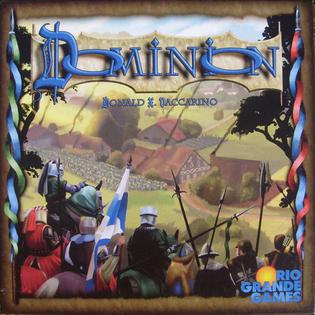
Dominion is a deck-building card game created by Donald X. Vaccarino and published by Rio Grande Games. Each player uses a separate deck of cards and draws their hands from their own decks, not those of others. Players use the cards in their hands to perform actions or buy cards from a common pool of card stacks. The player with the most victory points wins. The game has a medieval theme with card names referencing pre-industrial, monarchical, and feudal social structures.
Sid Meier's Civilization: The Boardgame is a 2002 board game created by Glenn Drover based on the Civilization series of video games, in particular, Civilization III. Drover himself was a sales manager at Microprose during the original development of Civilization, though he was not directly involved in the creation of the video game.
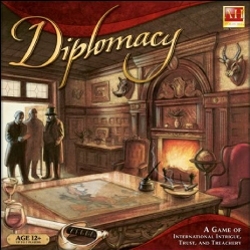
Diplomacy is an American strategic board game created by Allan B. Calhamer in 1954 and released commercially in the United States in 1959. Its main distinctions from most board wargames are its negotiation phases and the absence of dice and other game elements that produce random effects. Set in Europe in the years leading to the Great War, Diplomacy is played by two to seven players, each controlling the armed forces of a major European power. Each player aims to move their few starting units and defeat those of others to win possession of a majority of strategic cities and provinces marked as "supply centers" on the map; these supply centers allow players who control them to produce more units. Following each round of player negotiations, each player can issue attack and support orders, which are then executed during the movement phase. A player takes control of a province when the number of provinces that are given orders to support the attacking province exceeds the number of provinces given orders to support the defending province.

7 Wonders is a board game created by Antoine Bauza in 2010 and originally published by Repos Production in Belgium. 7 Wonders is a card drafting game that is played using three decks of cards featuring depictions of ancient civilizations, military conflicts, and commercial activity. The game is highly regarded, being one of the highest rated games on the board game discussion website BoardGameGeek. 7 Wonders has won more than 30 gaming awards, including the inaugural Kennerspiel des Jahres connoisseurs' award in 2011. The game has been cited by leading designers as one of the most influential board games of the last decade.
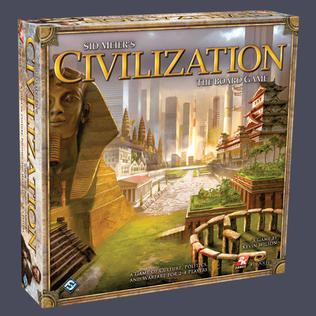
Sid Meier's Civilization: The Board Game is a 2010 board game created by Kevin Wilson based on the Sid Meier's Civilization series of video games and published by Fantasy Flight Games. While the previous board game based on Sid Meier's Civilization, published by Eagle Games in 2002, was based on Civilization III, the 2010 version takes its primary inspiration from Civilization IV. Its expansions, Fame and Fortune and Wisdom and Warfare, also began to incorporate concepts derived from Civilization V.
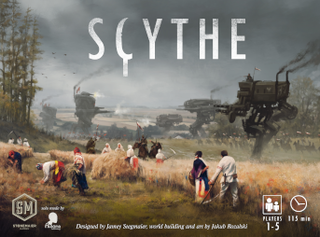
Scythe is a board game for 1 to 5 players designed by Jamey Stegmaier and published by Stonemaier Games in 2016. Set in an alternate history 1920s Europe, in Scythe players control factions that produce resources, build economic infrastructure, and use giant dieselpunk war machines called mechs to fight and control territory. Players take up to two actions per turn using unique player boards, with the game proceeding until one player has achieved six achievements, at which point the players receive coins for their achievements and territories controlled, with the player with the most coins winning.
















